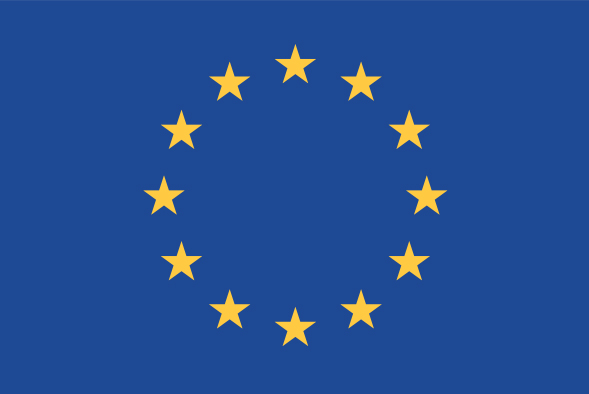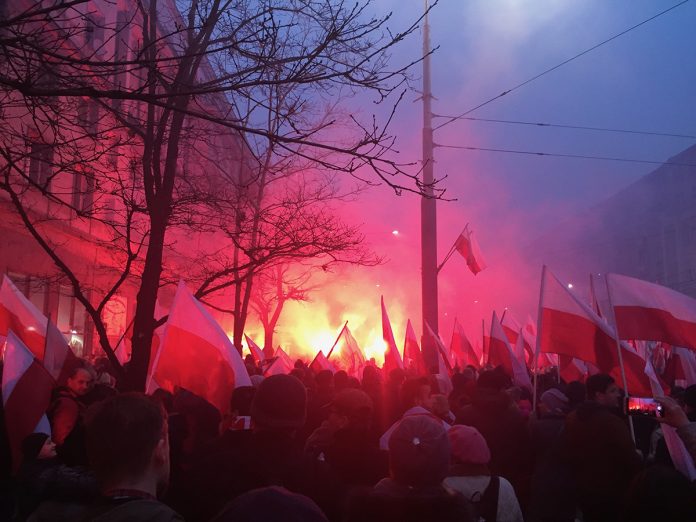Jan Kubik and Alicja Haran discuss the POPREBEL and FATIGUE projects, which engage with the rise of populism & illiberalism in Central and Eastern Europe
In September 2018, Poland’s President Andrzej Duda told an electoral rally that the EU is an “imaginary community from which we don’t gain much”. It is a shocking statement from the sitting President of a country that received nearly 2% of its Gross Domestic Product from European Union contributions in 2017 and has benefited economically from the membership. While its contributions to the EU budget seem to be proportional to the size of the economy (i.e., GDP), Poland is one of the largest recipients of EU funding. In fact, the disparity between the funding and contributions since 2004, when Poland was admitted to the European Union, has increased exponentially.
On October 7th, 2021, the Polish Constitutional Tribunal decided that the country’s law is supreme to the law of the European Union. The legal reasoning behind the court’s decision comes from the belief that the EU Constitution infringes upon the functionality of Poland’s Constitutional and judicial processes. This decision has provoked a stern rebuke from top European officials, including the European Commission’s President, Ursula von der Leyen and raised many eyebrows among EU officials and citizens. On 19th October, von der Leyen confronted Polish Prime Minister, Mateusz Morawiecki, pointing out the court system’s disregard for the rule of law and emphasising the compatibility of European unity and national sovereignty. Poland’s right-wing populist government is not the only “rebel” in the EU. The Hungarian Prime Minister, Victor Orban, asserted boldly that the “doctrine that ‘democracy can only be liberal’ – that golden calf, that monumental fetish – has been toppled”.
Why do these two political leaders engage in anti-EU and anti-democratic philippics, despite the comparatively high level of trust in the EU and democracy among their populations? Why do they alienate the organisation whose membership had been once an unattainable dream and was eventually secured through many sacrifices? As always in politics, we must first assume that an ostensibly senseless strategy is assumed to be effective, and it indeed is. Both Duda’s PiS and Orban’s Fidesz have been electorally very successful, the former since 2015 and the latter even longer, since 2010.
This means that their right-wing populist message resonates with a sufficiently large section of the electorate. How does it work? What is populism, particularly its right-wing variant and why has it become so popular in recent years? To answer these and several other questions, a team led by the UCL’s School of Slavonic and East European Studies embarked on two large, international projects, financed by the European Commission: POPREBEL (Populist rebellion against modernity in 21st-century Eastern Europe: neo-traditionalism and neo-feudalism) and FATIGUE (Delayed Transformational Fatigue in Central & Eastern Europe: Responding to the Rise of Illiberalism/Populism). Their full results are expected by the end of 2022, but we already have several preliminary observations.
What is our angle?
The rise of populism, including its right-wing variant, is a worldwide occurrence. It has already seriously destabilised liberal democracies from Brazil to the United States. We approach it as an ideology that essentially makes five interrelated claims: (1) the world is fatally split between “the corrupt elite” and “the pure people”, (2) the antagonism between these two groups drives political and social processes, (3) it is not just any conflict, but rather a monumental battle of “good” versus “evil,” (4) and in that battle the rules of representative politics do not apply; all that matters is the will of the people – which only the populists claim to know, (5) the definition of “the people” is also determined by the populists using the exclusivist criteria of “pure” nationality, “proper” religion or even “superior” race. All elements of such ethno-populist ideology resonate with a number of traditionalist strains present in all national cultures, at least to some degree. Agitated by the ethno-populist ideology these elements come to the fore of political and cultural life.
Since populist resurgence is a complex phenomenon, we approach it from several angles simultaneously, relying on the insights of several disciplines and a diverse methodological toolbox. Our team is composed of economists, anthropologists, historians, cultural sociologists and political scientists. We examine large economic databases, but also immerse ourselves in the minutiae of social life via online and face-to-face ethnographic studies. We study political parties and social movements, but also religious organisations, cultural productions, popular magazines and public opinion surveys.
It is economy, stupid! Or is it?
For some people, the rise of populism is best explained by focusing on economic factors, such as the relative impoverishment of a large part of the populace due to the negative effects of globalisation or/and post-communist transformations. As we show, however, the role of economics (and political economy) in explaining the rise of populism is limited for at least two reasons.
First, populism is no longer associated with unsustainable macro-economic positions and policy cycles that once resulted in the collapse of the economies of Latin America. Economists, therefore, need to re-design their studies by moving away from macroeconomic analyses and switching to a micro view.
Second, and more importantly, as populism is in essence a political phenomenon driven mostly by identity politics and cultural factors, economists need to include non-economic factors in their analyses. Therefore, POPREBEL and FATIGUE economists focus on both the demand and supply sides of the rise of populism.
In our studies on the demand side, we rely on Karl Polányi’s ideas and approach the rise of populism as a countermovement to the rise of neoliberalism. We also conduct rigorous quantitative testing of the relevance of such factors as the unemployment shock of the global financial and economic crisis of 2008/ 2009 and the migration crisis shock of 2015. We have already challenged the usefulness of the economic voting thesis, as populist parties often “hide” negative economic trends by shifting the focus of electoral competition away from economic concerns to other issues.
On the supply side, the project scrutinises the policies adopted by the populist governments in Central and Eastern Europe. We have observed, for example, that even when the populists avoid employing irresponsible policies, the ultimate result of their rule over the economy is not unproblematic. One of our key concepts, neo-feudalism, is designed to examine the (re-)emergence of personalistic depen- dencies and their generally negative consequences, especially in state-business relations. Neo-feudalism, as it has emerged recently in East-Central Europe, is a unique capitalist mode of production, characterised by the hierarchical, thoroughly personalised and ethically controversial coordination of late-modern societies.

Culture matters
Since economic explanations of the rise of right-wing populism are incomplete, several of our researchers have turned their attention to the role of cultural and social processes and their complex interactions with economic factors. We have organised our work under the heading of yet another custom-made concept: neo-traditionalism. There is nothing unusual in politicians and activists invoking their societies’ traditions as they try to garner support for themselves or the whole system.
A serious concern arises when the process displays two additional features: (1) tradition is defined and promoted from the top by state institutions that neglect to consider societal diversity and the plurality of its visions of the collective past and (2) the “official” tradition is built on the principles that are in conflict with the rules of a larger organisation to which a given state belongs. This is exactly what is happening in the European Union these days. Both Polish and Hungarian governments have engaged in the aggressive development and promotion of the official culture that clearly reflects the ideas and values of only one section of the population.
Moreover, this culture is explicitly constructed around the values that are in direct conflict with the principles that constitute the explicit, axiological foundation of the European Union, such as tolerance, respect for human rights of all people (not just the heterosexual majority), and respect for the plurality of national and religious self-conceptions.
Neo-traditionalism is a form of conservative, nationalistic ideological programme that gains prominence amidst the search for secure and well-understood traditional norms that can help to deal with ontological insecurity caused by fast change, globalisation and Europeanisation. People who feel insecure tend to be sceptical about the core precepts of modernity and reject liberal values, finding solace in traditions, fundamentalist readings of their religion, ethnic purity and assertive nationalism. Neo-traditionalism resonates with those who distrust and fear various “others,” foreigners, immigrants, people of “alien” religions, ethnicities, or sexual orientation.
Powerful institutions, such as governments and churches, have a choice. They can either try to assuage people’s fears and encourage accommodating (neo)traditionalist themes within the framework of commonly accepted European values, for example, in the form of “modern” conservatism, or they can exacerbate the cultural conflict by championing extreme and dogmatic elaborations of tradition. The latter choice has been made by both the Polish and Hungarian governments and several other far-right movements and parties across Europe.
Everyday indignities
Populists benefit from people’s unhappiness. From the outset of the project, we have convened a conversation online to learn more about it. We invite people from various walks of life to an “ethnographic” conversation or long interviews and listen to their stories. A custom-made computer programme analyses the results of these encounters and identifies repeatable patterns in people’s concerns, worries and hopes.
Our analysis of over 4,000 contributions in three languages is guided by the concept of collective intelligence. People’s responses, sometimes brief interventions, sometimes elaborate stories, are coded, and the emerging network of coded meanings reveals the contours of this intelligence. We can observe the similarities and differences between the three language communities not only in the selection of issues that each of them regards as the most pressing, but also in the configurations of concerns and their consequences for political choices. For example, we have already detected the centrality of the perception among the Polish community that the state is ineffective in addressing people’s problems in such areas as healthcare and housing.
Yet, the existence of grievances about a “cardboard state” does not always translate into the support for anti-systemic (for example, far right-wing) parties, but it does lead to a general dissatisfaction with politics.
What to do?
Ostensibly egalitarian, right-wing populist ideology elevates some categories and groups of people over others: heterosexuals over the LGBT+ community, natives over foreigners, a co-religionist faithful over infidels, “whites” over “people of colour” and – sometimes – men over women. Its people-friendly rhetoric hides exclusivist and discriminatory practices such as the neo-feudal intertwining of politics and economy and an assault on the sovereignty of courts and the independence of the media.
Very few people believe that right-wing populism is harmless. While it attracts supporters by offering them an antidote to the acutely felt sense of economic dislocation and cultural disorientation, its precepts are deadly for liberal democracy. What can be done? The liberal-democratic side must accept that the anxieties generated by the massive transformation of geopolitical, technological and socio-economic life are real and it must offer its own remedies. But at the same time, anti-populist education must be considerably intensified and given the complexity of the populist phenomenon, it must include not only a clear exposition of the merits of the liberal-democratic institutional order, but also a convincing delineation of the culture that needs to be cultivated in order to assure democracy’s survival.
As we are developing our recommendations, we begin by imagining the situation in 10 or 20 years’ time. One of the POPREBEL teams prepares foresight scenarios and investigates how different combinations of several macro-drivers might affect populism’s wherewithal by 2030. Will a rise in geopolitical confrontation lead to a slowing of globalisation and thereby a tightening of political ranks in the West that curbs the lure of populism? Or have authoritarian temptations in the meantime become so rooted that they will – in a mutually reinforcing manner – make dealing with the world’s challenges only more difficult, thereby producing a wholly downward spiral?
In March 2020, the COVID-19 pandemic added yet another wildcard to this foresight research, since the way in which the world comes out of this crisis will either magnify or temper the macro-drivers we have already seen. POPREBEL’s scenario research is not about predicting the future; it is about modelling several permutations of events and processes that are most likely in the years ahead. This will help both policymakers, and average citizens understand better the interlinkages between global, European and national politics, as they aim to make sense of populism in its contemporary form.


This project has received funding from the European Union’s HORIZON 2020 Research and Innovation programme under the Grant Agreement no. 822682.


This project has received funding from the European Union’s HORIZON 2020 Research and Innovation programme under the Marie Skłodowska-Curie Grant Agreement no. 765224.
Please note: This is a commercial profile











